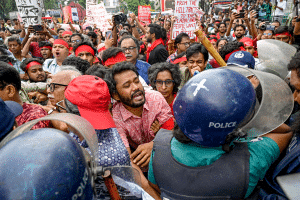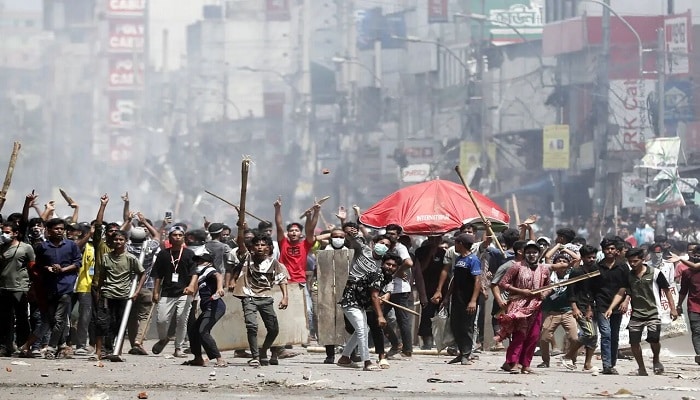PNN – Hindustan Times wrote in a report: The news indicates that the Bangladesh army and the interim government have not been able to control the groups opposed to the party of the resigned prime minister and the widespread violence in this country, and the main reason for this inability is the rise of extremist groups.
According to the report of Pakistan News Network, the interim government of Bangladesh canceled the ban imposed on the political activities of Jamaat-e-Islami and its student wing in the past few days.
In 2013, two court rulings were issued banning the registration of this party in Bangladesh elections. The Ministry of Interior of Bangladesh reminded in its ruling: The cancellation of the ban was based on the lack of evidence that Jamaat-e-Islami and its student wing were involved in terrorist activities.
Jamaat-e-Islami Bangladesh was founded by Abul Ala Maududi in 1941, and after the independence of Bangladesh in 1971, the new government banned Jamaat-e-Islami from political participation. Some of its leaders were also exiled to Pakistan. After the assassination of the first president of Bangladesh and the military coup in 1975, the ban on this group was lifted and the new party Jamaat-e-Islami Bangladesh was formed, the exiled leaders were allowed to return.
In an analysis of the current situation in Bangladesh, the Hindustan Times news website wrote: A month after the overthrow of Sheikh Hasina, the interim government of Bangladesh headed by the pro-Western thinker Muhammad Yunus and the army commander General Wakralzaman failed to establish law and order with the rapid emergence of the so-called Jamaat-e-Islami. Even using the name and reputation of the Bangladesh Nationalist Party led by Khaleda Zia has not been able to restore peace to Bangladesh.
The re-emergence of the Jamaat-e-Islami party, which has deep ideological ties with the Muslim Brotherhood, and its tactical hand-in-hand with two extremist groups, the Islamic Defense and Ansar al-Bangla, which are pro-ISIS, have jeopardized Bangladesh’s democratic credibility. Intelligence inputs indicate that the leaders of student protest groups are also controlled or perhaps influenced by extremists.
This report states: The re-emergence of “Jamaat-e-Islami” has been taken into consideration by the national security authorities of India because this issue will have security implications on Indian soil. In the 1990s, Jamaat-e-Islami was behind the rise of the Muslim student movement across India, especially in Uttar Pradesh, Maharashtra, Andhra Pradesh before it split into two. After controlling the situation in India, these protestors went to Pakistan and formed the Indian Mujahideen group.
Hindustan Times claimed: Jamaat-e-Islami Bangladesh has played a key role in organizing youth extremism to take up arms.

While the caretaker government in Bangladesh is in no rush to announce an election date, a weak government, rising extremism and a deteriorating economy spell disaster for Dhaka. On the other hand, panicked members of the Awami League may regain strength in the coming months and join hands to challenge the BNP and even stronger groups. Some believe that Jamaat-e-Islami has gained its position in Bangladesh after August 5 at the expense of Bangladesh Nationalist Party.
Hindustan Times adds: Although Bangladesh’s caretaker prime minister Mohammad Younis targets Sheikh Hasina and calls for the extradition of the ousted prime minister from India, the main threat to Bangladesh’s politics is actually from extremists.
While India is concerned about the violence and targeting of Hindu League and Awami League members, it also sees the situation in Bangladesh’s caretaker government as critical, which could lead to growing discontent among the same youth who ousted Sheikh Hasina. This issue along with the expanding economic crisis, the closure of textile factories and clothing production units will lead to unemployment and more political turmoil. Currently, the foreign and domestic debt of Bangladesh has exceeded 100 billion dollars.
The protests of Bangladesh started on July 1, equal to July 11, 1403; When student activists at Dhaka University, the country’s largest university, violently clashed with police and government supporters. The protests were rooted in a controversial job quota system that allocated up to 30 percent of government jobs to family members of Bangladesh’s 1971 independence war against Pakistan, known as “freedom fighters.”
What began as a peaceful student protest against government employment quotas turned into a nationwide campaign of civil disobedience and violence that eventually led to the deployment of the military and martial law by the then government.
Sheikh Hasina, 76 years old, the daughter of Sheikh Mujibur Rahman, the founder of Bangladesh, who was the prime minister of this country for 15 years since 2009, resigned from her position in a helicopter from Dhaka to India, following the continuation of unrest and the intensification of conflicts.
One day after Sheikh Hasina’s resignation and flight, the office of the president of Bangladesh dissolved the parliament of this country, and Nobel Peace Prize winner Muhammad Yunus was sworn in as the head of the interim government in this country as requested by the protesters.
Sheikh Hasina, the resigned Prime Minister of Bangladesh, later claimed that America sought to take over the strategic island of St. Martin in exchange for her political support.

